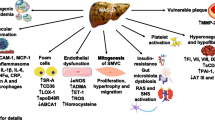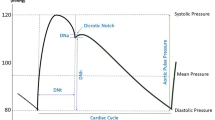Abstract
Purpose
The aim of this study was to investigate the effects of flaxseed oil consumption on serum systemic and vascular inflammation markers, and oxidative stress in hemodialysis (HD) patients.
Methods
In this randomized, double-blind, clinical trial, 34 HD patients were randomly assigned to either the flaxseed oil or the control group. The patients in the flaxseed oil group received 6 g/day flaxseed oil for 8 week, whereas the control group received 6 g/day medium-chain triglycerides (MCT) oil. At baseline and the end of week 8, serum concentrations of high-sensitive C-reactive protein (hs-CRP), soluble intercellular adhesion molecule type 1 (sICAM-1), soluble vascular cell adhesion molecule type 1 (sVCAM-1), sE-selectin, and malondialdehyde (MDA) were measured after a 12- to 14-h fast.
Results
Serum hs-CRP, a systemic inflammation marker, and sVCAM-1, a vascular inflammation marker, reduced significantly in the flaxseed oil group at the end of week 8 compared to baseline (P < 0.05), and the reductions were significant in comparison with the MCT oil group (P < 0.05). There were no significant differences between the two groups in mean changes in serum sICAM-1, sE-selectin, and MDA.
Conclusion
This study indicates that daily consumption of 6 g flaxseed oil reduces serum hs-CRP and sVCAM-1, which are two risk factors for CVD. Therefore, the inclusion of flaxseed oil in the usual diet of HD patients can be considered as a strategy for reducing CVD risk factors.
Similar content being viewed by others
References
Qureshi AR, Alvestrand A, Divino-Filho JC et al (2002) Inflammation, malnutrition, and cardiac disease as predictors of mortality in hemodialysis patients. J Am Soc Nephrol 13(suppl 1):S28–S36
Schiffrin EL, Lipman ML, Mann JFE (2007) Chronic kidney disease: effects on the cardiovascular system. Circulation 116(1):85–97
Stenvinkel P (2002) Inflammation in end-stage renal failure: could it be treated? Nephrol Dial Transplant 17(suppl 8):33–38
Stenvinkel P, Yeun JY (2004) Role of inflammation in malnutrition and atherosclerosis in chronic renal failure. In: Kopple JD, Massry SG (eds) Nutritional management of renal disease, 2nd edn. Lippincott Williams & Wilkins, Philadelphia
Jacobs P, Glorieux G, Vanholder R (2004) Interleukin/cytokine profiles in haemodialysis and in continuous peritoneal dialysis. Nephrol Dial Transplant 19(suppl 5):v41–v45
Zimmermann J, Herrlinger S, Pruy A et al (1999) Inflammation enhances cardiovascular risk and mortality in haemodialysis patients. Kidney Int 55(2):648–658
Rabb H, Calderon E, Bittle PA et al (1996) Alterations in soluble intercellular adhesion molecule-1 and vascular cell adhesion molecule-1 in haemodialysis patients. Am J Kidney Dis 27(2):239–243
Musiał K, Zwolińska D, Polak-Jonkisz D et al (2004) Soluble adhesion molecules in children and young adults on chronic hemodialysis. Pediatr Nephrol 19(3):332–336
Musiał K, Zwolińska D, Berny U et al (2004) Soluble adhesion molecules in children and young adults with chronic renal failure treated conservatively. Rocz Akad Med Bialymst 49:209–212
Musiał K, Zwolińska D, Polak-Jonkisz D et al (2005) Serum VCAM-1, ICAM-1, and L-selection levels in children and young adults with chronic renal failure. Pediatr Nephrol 20(1):52–55
Bolton CH, Downs LG, Victory JG et al (2001) Endothelial dysfunction in chronic renal failure: roles of lipoprotein oxidation and pro-inflammatory cytokines. Nephrol Dial Transplant 16(6):1189–1197
Locatelli F, Canaud B, Eckardt KU et al (2003) Oxidative stress in end-stage renal disease: an emerging threat to patient outcome. Nephrol Dial Transplant 18(7):1272–1280
Canaud B, Cristol J, Morena M et al (1999) Imbalance of oxidants and antioxidants in haemodialysis patients. Blood Purif 17(2–3):99–106
Bloedon LT, Balikai S, Chittams J et al (2008) Flaxseed and cardiovascular risk factors: results from a double blind, randomized, controlled clinical trial. J Am Coll Nutr 27(1):65–74
Lemos JR, de Alencastro MG, Konrath AV et al (2012) Flaxseed oil supplementation decreases C-reactive protein levels in chronic hemodialysis patients. Nutr Res 32(12):921–927
Zhao G, Etherton TD, Martin KR et al (2004) Dietary alpha-linolenic acid reduces inflammatory and lipid cardiovascular risk factors in hypercholesterolemic men and women. J Nutr 134(11):2991–2997
Caughey GE, Mantzioris E, Gibson RA et al (1996) The effect on human tumor necrosis factor alpha and interleukin 1 beta production of diets enriched in n-3 fatty acids from vegetable oil or fish oil. Am J Clin Nutr 63(1):116–122
Kontogianni MD, Vlassopoulos A, Gatzieva A et al (2013) Flaxseed oil does not affect inflammatory markers and lipid profile compared to olive oil, in young, healthy, normal weight adults. Metabolism 62(5):686–693
Daugirdas JT, Stone JCV (2001) Physiologic principles and urea kinetic modeling. In: Daugirdas JT, Blake PG, Ing TS (eds) Handbook of dialysis, 3rd edn. Lippincott Williams & Wilkins, Philadelphia
Carrero JJ, Stenvinkel P (2013) Inflammation in chronic kidney disease. In: Kopple JD, Massry SG, Kalantar-zadeh K (eds) Nutritional management of renal disease, 3rd edn. Academic Press, Amsterdam
Khalatbari-Soltani S, Jamaluddin R, Tabibi H et al (2013) Effects of flaxseed consumption on systemic inflammation and serum lipid profile in hemodialysis patients with lipid abnormalities. Hemodial Int 17(2):275–281
Jangale NM, Devarshi PP, Dubal AA et al (2013) Dietary flaxseed oil and fish oil modulates expression of antioxidant and inflammatory genes with alleviation of protein glycation status and inflammation in liver of streptozotocin-nicotinamide induced diabetic rats. Food Chem 141(1):187–195
Neurath MF, Fuss I, Schürmann G et al (1998) Cytokine gene transcription by NF-kappa B family members in patients with inflammatory bowel disease. Ann N Y Acad Sci 859:149–159
Moreira AC, Gaspar A, Serra MA et al (2007) Effect of a sardine supplement on C-reactive protein in patients receiving hemodialysis. J Ren Nutr 17(3):205–213
Chait A, Han CY, Oram JF et al (2005) Thematic review series: the immune system and atherogenesis. Lipoprotein-associated inflammatory proteins: Markers or mediators of cardiovascular disease. J Lipid Res 46(3):389–403
de Winther MP, Kanters E, Kraal G et al (2005) Nuclear factor kappaB signaling in atherogenesis. Arterioscler Thromb Vasc Biol 25(5):904–914
Dewell A, Marvasti FF, Harris WS et al (2011) Low- and high-dose plant and marine (n-3) fatty acids do not affect plasma inflammatory markers in adults with metabolic syndrome. J Nutr 141(12):2166–2171
Chen W, Esselman WJ, Jump DB et al (2005) Anti-inflammatory effect of docosahexaenoic acid on cytokine-induced adhesion molecule expression in human retinal vascular endothelial cells. Invest Ophthalmol Vis Sci 46(11):4342–4347
Wang TM, Chen CJ, Lee TS et al (2011) Docosahexaenoic acid attenuates VCAM-1 expression and NF-κB activation in TNF-α-treated human aortic endothelial cells. J Nutr Biochem 22(2):187–194
Tetta C, Biasiol S, Schiavon R et al (1999) An overview of haemodialysis and oxidant stress. Blood Purif 17(2–3):118–126
Acknowledgments
The authors thank the staff of the Hemodialysis Units at Taleghani and Modares hospitals in Tehran, Iran, for their invaluable assistance, and the staff of the research laboratory of Research Institute for Endocrine Sciences and the Nutrition research laboratory of the Faculty of Nutrition and Food Technology for their technical assistance.
Author information
Authors and Affiliations
Corresponding author
Ethics declarations
Funding support
This study was funded by the National Nutrition and Food Technology Research Institute of Iran (Grant Number 93-5112).
Conflict of interest
The authors declare that they have no conflict of interest in the publication of the above manuscript. In addition, Dr. Hadi Tabibi has received a research grant from the National Nutrition and Food Technology Research Institute of Iran and declares that he has no conflict of interest with this research institute.
Ethical approval
All procedures performed in our study were in accordance with the ethical standards of the institutional and/or national research committee and with the 1964 Helsinki Declaration and its later amendments or comparable ethical standards. The study protocol was approved by the Ethics Committee of the National Nutrition and Food Technology Research Institute of Iran.
Informed consent
Written informed consent was obtained from all patients included in the study.
Rights and permissions
About this article
Cite this article
Mirfatahi, M., Tabibi, H., Nasrollahi, A. et al. Effect of flaxseed oil on serum systemic and vascular inflammation markers and oxidative stress in hemodialysis patients: a randomized controlled trial. Int Urol Nephrol 48, 1335–1341 (2016). https://doi.org/10.1007/s11255-016-1300-5
Received:
Accepted:
Published:
Issue Date:
DOI: https://doi.org/10.1007/s11255-016-1300-5




